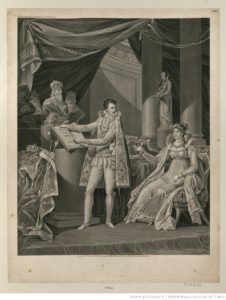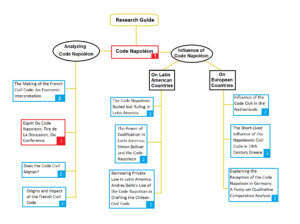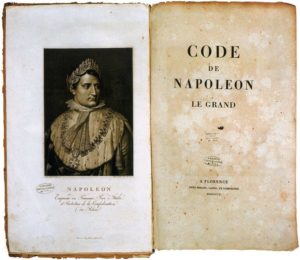 By: Cemal Kutay Koman
By: Cemal Kutay Koman

“My glory is not that I won forty battles and dictated the law to kings… Waterloo wipes out the memory of all my victories… But what will be wiped out by nothing and will live forever is my Civil Code.”
– Napoleon Bonaparte
The Pre-Napoleonic French legal system lacked harmony. The word “system” cannot even be used to describe this web of laws because there was no systematic structure that reigned over France. Different provinces of France were governed by different sets of laws. Southern provinces of France were governed by Roman laws whereas Northern provinces of France were governed by customary laws.
“Is it not an absurd and terrible thing that that which is true in one village is false in another? What kind of Barbarism is it that citizens must live under different laws? When you travel in this kingdom you change legal systems as often as you change horses.”1
– Voltaire
To avoid conflicts and to have a systematic common law, on March 21, 1804, Napoleon Bonaparte established the French Civil Code also known as Code Napoleon and The Napoleonic Code. The Napoleonic Code was largely influenced by Napoleon’s interpretation of the French Revolution, which was built upon the ideals of Enlightenment. The code “protected many of the gains of the French Revolution by ensuring equality of all male citizens before the law, universal male suffrage, property rights, and religious liberty”2 while “abolishing all feudal and local customs.”3
Even today, effects of the Napoleonic Code can be seen. It largely influenced the civil codes of numerous European and Latin American countries.
The Making of the French Civil Code: An Economic Interpretation
The purpose of this paper is to analyze how the Napoleonic Code (French Civil Code) was made. The paper states that there are two different ways of creating laws. One of them is customary codification, meaning the crystallization of already established social principles. The other is contractual codification which is the creation of new laws through rational thinking. It compares the codification methods and delves into the Napoleonic Code through a lens that focuses on these two different mechanisms of forging laws.
Josselin, Jean-Michel, and Alain Marciano. “The Making of the French Civil Code: An Economic Interpretation.” European Journal of Law and Economics, November 2002, 193-203.
Esprit Du Code Napoléon: Tiré De La Discussion, Ou Conférence Historique, Analytique Et Raisonnée Du Projet De Code Civil, Des Observations Des Tribunaux
This book is one of the few primary sources that can be found in this research guide. It was published in 1805/1807 and was written by Jean Guillaume Locré de Roissy, who was the Secretary-General of the Conseil d’État.
It explains the logic behind the Napoleonic Code (Code Civil) and highlights the elements that differ the Code from its predecessors. It demonstrates how the Napoleonic Code should be interpreted through specific examples. To illustrate, in chapter 4 part 2 section 6, the book talks about the things that needs to be done if a person dies in the sea. Death was a topic that was covered in the Napoleonic Code. This book shows the correct interpretation of the Code by answering questions like: How to make sure that the person has died? How the death of this person should be archived? Thus, it clarifies the ideas of the Napoleonic Code.
France. Conseil d’État. Esprit Du Code Napoléon: Tiré De La Discussion, Ou Conférence Historique, Analytique Et Raisonnée Du Projet De Code Civil, Des Observations Des Tribunaux. By Jean Guillaume Locré. 1805-1807.
This article analysis the principles of the Napoleonic Code and highlights the reasons behind jurists’ contradictory actions with the Code. By doing so, it highlights the limitations of not only the Napoleonic Code, but also the concept of codified law system. It supports the idea that Codes are kind of a “portal from which jurists can make their way towards many different rules”. It also claims that codification is a unifying process, not the unity of law.
Josselin, Jean-Michel, and Alain Marciano. “The Making of the French Civil Code: An Economic Interpretation.” European Journal of Law and Economics, November 2002, 193-203.
Origins and Impact of the French Civil Code
This semi-professional article analyzes the legal, political, and theoretical background of the Napoleonic Code along with the making and the promulgation of this Code. It also highlights the evolution and the impact of the Napoleonic Code on the French community.
Additional Notes: This “article” is from the official website of the Ministry of Justice of the Socialist Republic of Vietnam. Although the article is fluent and understandable, it was translated from Vietnamese to English. This might have weakened the content. Furthermore, unlike the other articles in this research guide, it is not structured in a professional way.
Delplanque, Catherine. “Origins and impact of the French Civil Code,” trans. Edith Horak, March 06, 2012.
Code Napoleon (The Napoleonic Code)
These are the other primary sources that can be found in this research guide. The original Napoleonic Code was digitized by the Biblioteca Nacional de Francia (BNF). It can be reached through clicking the “French” heading. This section also has the translated version of the Napoleonic Code. It can be reached through clicking the “English” heading.
The Code Napoleon: Buried but Ruling in Latin America
This article explores the historical and the present-day effects of the Napoleonic Code on the Latin American countries. It delves into the development of the private laws and the influence of the Napoleonic Code in the construction of these laws in countries like Argentina and Chile. Later, the article shows the reasons behind the lessened effects of the Napoleonic Code in today’s Latin America. It claims that weakened European influence along with the globalization of business laws were two of the main reasons behind the diminishing effects of the Napoleonic Code on Latin America. However, this article claims that the Napoleonic Code will continue to rule in Latin America due to the logic behind its structure. Pierre Legrand asserted that the Napoleonic Code is the grammar of laws. Although sentences change, rules of grammar stay the same. Content of laws will always change; nevertheless, the style and the mentality in which they were written will always be the same.
Mirow, M. C. “The Code Napoleon: Buried but Ruling in Latin America.” Denver Journal of International Law and Policy, March 22, 2005, 179-94.
The Power of Codification in Latin America: Simon Bolívar and the Code Napoleon
The purpose of this article is to analyze the historical, cultural, and intellectual influences that played an important role in constructing the mindset of Simon Bolivar, who attempted to codify Gran Colombia based on the principles of the Napoleonic Code. Although Bolivar’s attempt was not successful, it clarified that Napoleonic Code was a major influence in Latin America in 19th century.
The article also claims that Bolivar’s main purpose in establishing a systematic civil law was not to make a liberal reform for his country but to regain the political power he once had through creating legal independence into his regime. Furthermore, it delves into Bolivar’s relationship with Andres Bello, who is the creator of the Chilean Civil Code, Jeremy Bentham, and Napoleon Bonaparte to show how his ideas regarding codification have changed.
Additional Notes: Although this article has a lot of information regarding Napoleonic Code, it mainly focuses on Simon Bolivar.
Mirow, M. C. “The Power of Codification in Latin America: Simon Bolívar and the Code Napoleon.” Tulane Journal of International and Comparative Law 8 (2000): 83-116.
This article supports the idea that, while constructing the Chilean Civil Code, Andres Bello benefited from different sources for different sections of his Code. It claims that Bello was influenced by the Spanish Colonial Law while preparing laws regarding family issues. On the other hand, for commercial principles, it claims that Bello was influenced by the Napoleonic Code. It also analyzes the historical and legal context of Chile to make a clear demonstration of Bello’s adaptation of these laws. It uses examples to show how a country uses other countries’ codes to create its own.
Mirow, M. C. “Borrowing Private Law in Latin America: Andres Bello’s Use of the Code Napolean in Drafting the Chilean Civil Code .” Louisiana Law Review 61, No. 2 (2001): 291-329.
This article argues that Burgerlijk Wetboek (BW) of 1838, which is the predecessor of Netherlands’ current civil code, was not a copy of the Napoleonic Code but an improved version of it. It provides the history of the development of law in Netherlands to highlight the context in which BW was written. It claims that Netherlands, while constructing BW, followed the structure of the Napoleonic Code but removed some of its laws, whilst improving the existing ones. The article also asserts that Netherlands created new laws to be used in BW during this period.
Meijer, Gerrit, and Sjoerd Y. Th. Meijer. “Influence of the Code Civil in the Netherlands.” European Journal of Law and Economics, November 2002, 227-36.
The Short-Lived Influence of the Napoleonic Civil Code in 19th Century Greece
This article is about the history of the development of the Greek Civil Code. It highlights Greece’s failed attempt to introduce a civil code which was built upon the principles of the Napoleonic Code, during the Greek War of Independence (1821-1827). It explains the elements that had affected the Greek Civil Code and transformed it into the Code it is today. Moreover, the article claims that Napoleonic Cade was not the only code that shaped the Greek Civil Code. It asserts that Justinian’s (Roman) Code along with the German Legal Theory also had an impact on the Code.
Hatzis, Aristides N. “The Short-Lived Influence of the Napoleonic Civil Code in 19th Century Greece.” European Journal of Law and Economics, November 2002, 253-63.
This article analysis the effects of the Napoleonic Code in different German States in the beginning of the 19th century. It analysis the reasons behind the varying adoptions and retentions of this Code by making a fuzzy-set qualitative comparative analysis (fsQCA). Qualitative comparative analysis “is the use of set-theory and Boolean logic to analyze combinations of casual conditions associated with an outcome of interest.” The article also claims that no single factor is responsible for the adoption and the retention of the Code. It asserts that factors like Napoleon’s varying influence on different German states along with the varying power of the feudal classes might have a combined effect in constructing the responses of the German states to Napoleonic Code.
Arvind, Tt, and Lindsay Stirton. “Explaining the reception of the Code Napoleon in Germany: a fuzzy-set qualitative comparative analysis*.” Legal Studies 30, no. 1 (2010): 1-29.
Works Cited
1. Cranston, Ross, ed. Making commercial law: Essays in Honour of Roy Goode. Oxford: Oxford University Press, 2005, Page 32.
2. Backman, Clifford R. The cultures of the West: a history. New York: Oxford University Press, 2013. Page 644.
3. Backman, Clifford R. The cultures of the West: a history. New York: Oxford University Press, 2013. Page 644.
Images (In order of Appereance)
1) http://gallica.bnf.fr/ark:/12148/btv1b6940753h
2) https://omeedalibehzadihistoricalthinking.wordpress.com/napoleonic-code/







